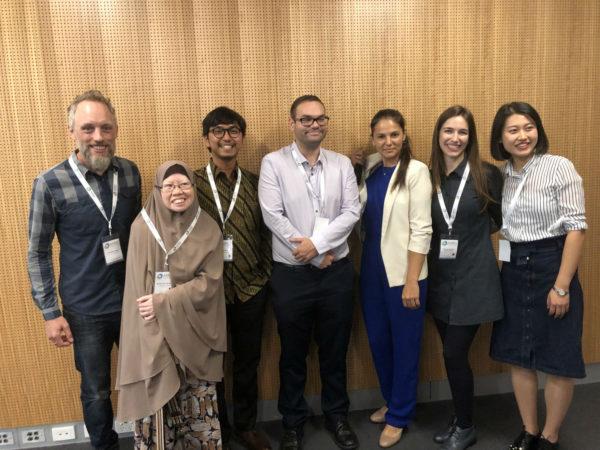Highlights from Day three at the 2019 AARES conference
Blog post prepared by Constantin Seidl and Nikki Dumbrell
A dominant theme on Friday, the final day of the 2019 Australasian Agricultural and Resource Economics Society (AARES) conference, was change and how that change can be managed.
The mini symposium about drought discussed the impacts of weather change and the form in which drought can impact farmers and how governments attempt to help farmers to manage that. Glyn Wittwer illustrated the labour market impacts of the current drought in NSW using results from CGE modelling. Reduced rainfall conditions in 2018 and 2019, together with higher than average temperatures across NSW led to a loss of approximately 8000 jobs and a decline in GDP and wage rates. Prof. John Freebairn discussed different drought response and relief policies, including farm business subsidies, farm household income support and farm insurance. While popular with politicians and farmers alike, these interventions are vertically inequitable, an inefficient use of government funds and dis-incentivise prudent and strategic farm risk management. So, as a profession, applied economics still has much to contribute to shape decision making in this space.
This was echoed by the presentations of Richard Heath (from the Australian Farm Institute) and David Zilberman, Professor at University of California Berkeley and President of the American Applied Economics Association (AAEA). Heath outlined the history of Australian farm and drought support schemes, identifying various concerns around equity between different farmer groups and whether those subsidies actually provide benefits to the Australian farming sector. Zilberman argued that the world we live in is defined by change and advocated for analysis on “economics in an era of disruptive innovation”. The key driver for future success will be the flexibility to adapt to rapidly changing circumstances, leading to economic dis-equilibria. This can have profound implication for agricultural production and supply chains, when they are viewed as a system of monopolies and oligopolies changing over time, rather than a perfect competition environment.
Further reading: Check out David Zilberman’s recent paper in the American Journal of Agricultural Economics titled ‘Agricultural Economics as a Poster Child of Applied Economics: Big Data & Big Issues’, available here: https://doi.org/10.1093/ajae/aay101

Early Career Professionals at the AARES conference
Turning this blog now to have a greater focus on the contributions and outcomes for Centre for Global Food and Resources (GFAR) participants at the conference:
GFAR PhD student Phassara Khamthara will presented a paper co-authored with Dr. Di Zeng, Prof. Randy Stringer and Abdul Hasibuan which aims to investigate the linkages between risk preference, off-farm income diversification and education spending among high-value horticultural farming households. The paper also incorporated gender perspectives and analysed both husband’s and wife’s risk preference which may have heterogeneous impacts.
Hery Toiba (a GFAR PhD graduate) presented some new work that explored how the growth in food retailers and supermarkets impacts farmers, presenting them with opportunities and challenges. While different farmer groups can tap into the opportunities of the modern food retail system, it is overall unable to improve farmer food security by increasing household food consumption diversity.
Change is also ripe within the Indonesian dairy industry, which sees rising dairy demand coupled with low milk quality, small dairy herds and low milk productivity. Rida Akzar GFAR PhD candidate, shared findings from the IndoDairy project, led by Prof. Wendy Umberger and funded by Australian Centre for International Agricultural Research (ACIAR). Specifically, Rida showed that adoption of better milk production technologies and strategies is not uniform across Indonesian dairy farmers. Rather, different clusters of farmers are at different stages in the adoption process, with the highest adopting category displaying higher levels of education, income, bigger dairy herds and higher milk producer prices. It is therefore important for government extension programs to recognise the different groups of dairy farmers and provide tailored assistance and extension.

Participants in the AARES Three Minute Thesis Competition. (L-R: Matthew Wysel Rahma Ma’mun, Rida Akzar, Constantin Seidl, Alfinura Sharafeyeva, Livia Padilha and Nikki Zhang)
Rida also followed this presentation with an excellent performance in the Three Minute Thesis Competition, for which he was recognised as the ‘runner-up’. Five GFAR PhD students participated in the competition: Alfinura Sharafeyeva, Sitti Rahma Ma’Mun, Constantin Seidl, Livia Padilha and Rida Akzar. Alongside GFAR participants were two University of New England (UNE) students, Matthew Wysel and Nikki (Yue) Zhang. The competition was tight! But, there can only be one winner and this year it was…. Alfinura Sharafeyeva. Congratulations Alfinura!
The Three Minute Thesis Competition was an excellent note on which to wrap up a conference with many opportunities for early career professionals to share their ideas and increase their profile.
